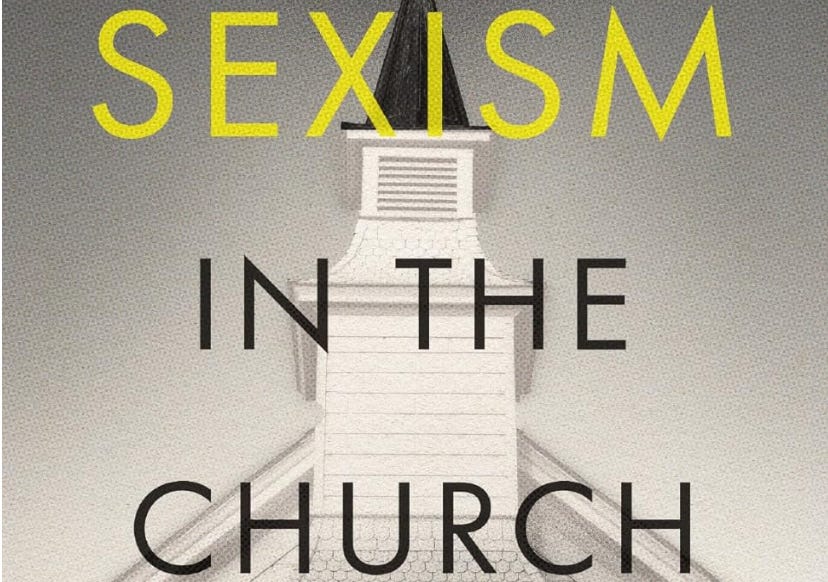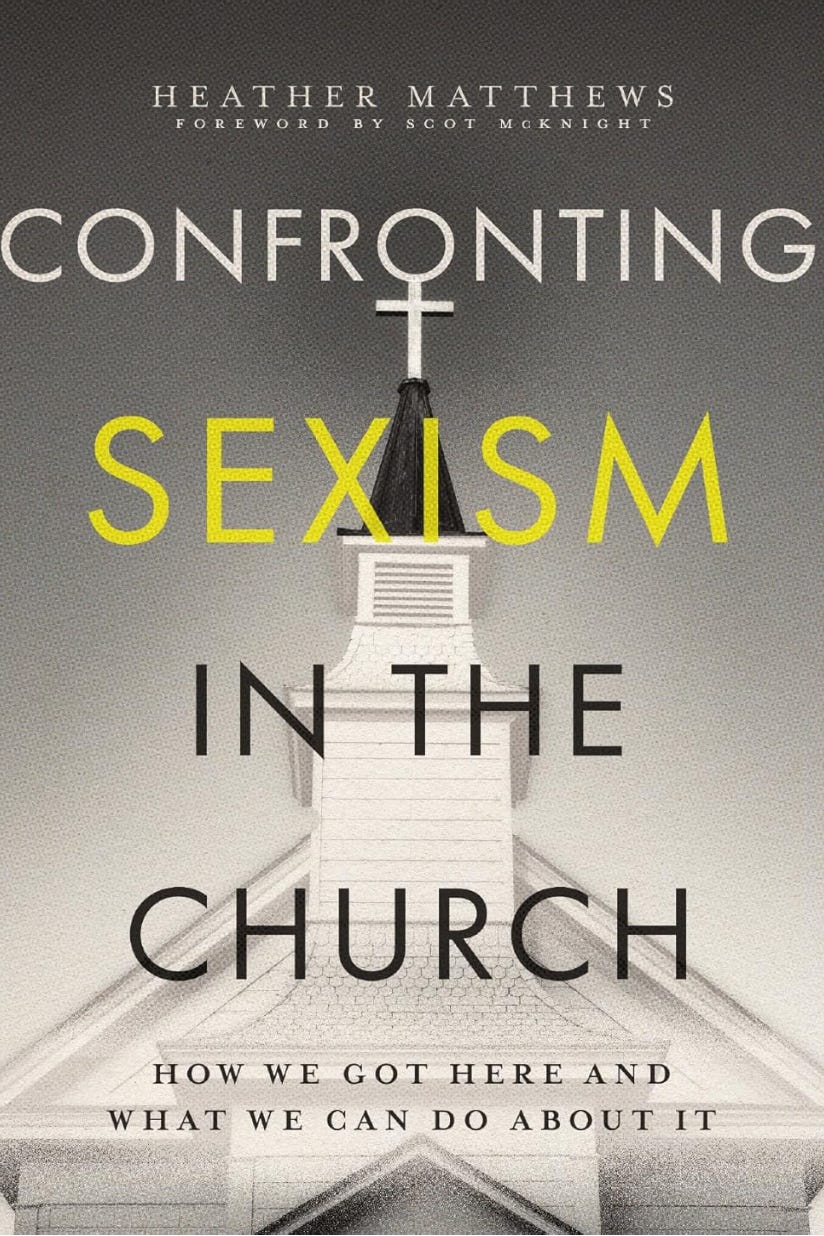Holding My Breath:
Chapter 2 of Confronting Sexism in the Church
“No hard feelings, right?” she sighed, avoiding my eyes.
At that moment, Dear Reader, the simmering feelings I had did indeed begin to harden.
My friend had come on the adult mission trip that I organized, participated in my pre-trip cross-cultural flexibility training, and then one night when the female missionary ushered us into her common room to give our coed group a Bible teaching, my friend abruptly stood-up and silently left the room. Several others from our group did the same, again without speaking.
They left because the missionary was a woman teaching men.
At the time, I shared their theology of gender but this behavior shocked me. Surely, we could be a little adaptable in a different context? I sat stunned, disbelief coursing through me, unsure of how to salvage the situation. Our team included one of our pastors who sat in the back and watched this unfold, offering no guidance to me or our group. When a pause came in the talk, he proceeded to have a quiet aside with the missionary, clarifying why people had left the room. If she had wondered about the abrupt exits, now she knew the reason with certainty: it was her gender that was the problem, not the content of her teaching.
These moments confused me on multiple levels, and I did not have the skills to understand them or the tools to deal with them. My friend’s complete and casual dismissal of my feelings struck me as bizarre; instead, I gave myself space to explore everything I felt. I let a wide range of feelings bubble; I let them solidify, becoming rocks I could hold in my hand.
One of my largest rocks was shame: shame at the way we treated the missionary, shame that I didn’t know how to handle the situation, shame that I was a woman who would be walked out on too. I felt tormented by my own faith, the center point of my life, that it would dismiss and devalue me because of my gender. I was disappointed in myself. I felt alienation in friendship. I felt abandoned by leadership. Later, I would experience exasperation when I realized that I had been taught only one very narrow and specific interpretation of “Biblical” gender; an interpretation that a respected Christian scholar at the local evangelical seminary that my pastors graduated from, a member of our church’s elder board, actively pushed against. I picked up these rocks and turned them over, looking at them from all sides. I held them up next to my Bible. I held them up like a mirror. Something was thoroughly broken, but what?
Chapter 1 of Heather Mattews’ book, Confronting Sexism in the Church, names the sharp edges of sexism in the church as beliefs and practices that prevent women from flourishing; beliefs and practices that instead bring harm. Women are minimized, restricted, and silenced due to their gender. When women are wounded by the church, we need to understand what cut them; we need to know what is broken.
In Chapter 2, Matthews explores what is broken. She helpfully acknowledges that when you’ve grown up inhaling the smoke of sexism, breathing clean air may not feel natural. You’ve likely been taught to downplay or ignore your feelings. She points to the smoke enveloping my mission trip and gives insight into my experience. If sexism in the church stems from the belief that women are not made in the image of God to the same degree as men and therefore, must be limited in roles and activities, Matthews asks what is it like when women encounter that in daily life? Her list is not exhaustive, but it brought clarity to my situation and many others.
It looks like the wounds women’s experiences often being overlooked because leaders aren’t affected personally. (“It’s not that big of a deal.”)
It looks like a lack of education on gender and the range of theological views surrounding it. (“We teach a plain reading of scripture.”)
It looks like the assumption that opportunities are equal and privilege doesn’t exist. (“I don’t see gender; I focus on the person.”)
It looks like the overt refusal to listen to women. (“Why would a woman go to seminary?”)
It looks like women being touched inappropriately. (“I’m sorry, but I’m human!”)
It looks like veiled restrictions on women, ostensibly for their own benefit. (“We want to avoid impropriety: men should not mentor women one-on-one.”)
It looks like microaggressions. (“This position is part-time.”)
It looks like mansplaining. (*interrupting* “What I’m saying is…”)
It looks like gendered stereotypes. (“Women are just better at cooking, cleaning, and childcare—they enjoy it.”)
It looks like androcentrism. (“We don’t a need maternity leave policy.”)
I’m sure your wife, daughter, sister, friend could list experiences too. We need education and engagement to understand how good aspects of the church have been intertwined with sexism. Most of the churches I’ve attended did not have the insight or the tools to help disentangle these experiences for me. Most of my work on disentanglement I did on my own or with a thoughtful group of students and professors when I attended seminary.
I didn’t want to read Matthews’ book.
I didn’t want to revisit the painful memories of this trip or a thousand other times when my gender has relegated me to a second-class position. I’d acknowledged these situations and put in the work to grow beyond them, can’t I be done thinking about this?
No, I can’t. Because I still encounter these situations. The smoke still swirls. And I know there are other girls and women sitting shell-shocked in the midst of a confusing situation where they don’t have the tools to understand what just happened. Matthews’ book can help. Women need to know there’s a better way. They need to know that it’s OK to have hard feelings. They need to know they can take time to examine each rock, one by one.
The rocks are not the problem. The smoke is.
Suggestions For Reflection:
1. What roles do women typically fill in your church and denomination? Do they come with pay and benefits? What types of decisions are women in charge of making? How are women mentored?
2. Explore a podcast or book highlighting women and reflect on how you feel about this content:
The Alabaster Jar S4 E33 | Debunking Gender Hierarchy in 1 Timothy 2
The Two Cities Episode #138 – Women and The Gender of God with Rev. Dr. Amy Peeler






I still remember opening my bulletin and looking at the order of service for a funeral service that I and 2 others were giving leadership. The 2 men were both listed as "Rev." I am also ordained. But they listed me as "Sharon Schultz", without even putting Pastor in front of my name. I've tried to train myself, over the years, not to let that kind of thing bother me, to brush it off, but that day it was too much, and I sat there in tears. That happened 13 years ago, and it came to mind as I read this article. It still hurts. Thank you, Scot, for highlighting this book. Thank you, Heather Matthews for writing and speaking out about the sexism women continue to face in daily life. And thank you, Heather Hart, for sharing your memories. Today I am so thankful to be part of the Mennonite Church in Saskatchewan, where we are almost half men and half women pastors. We are friends and colleagues, and we support and encourage each other. The small, rural church where I pastor is filled with the sounds of young children, youth, adults and seniors. I love it!! Together we are learning and growing together as the family of God and in relationship with each other. I'm so thankful these topics are being addressed and change is slowly happening.
Heather, I’m so sorry this happened to you, and yet so glad you’re telling the story and bringing it out into the light. Courage is catching!